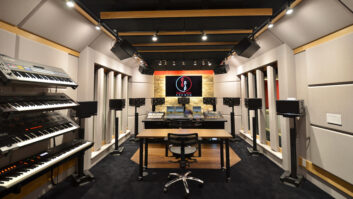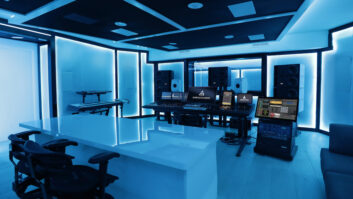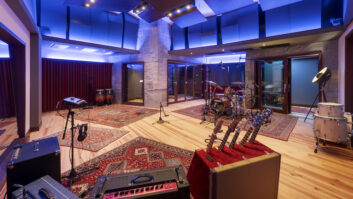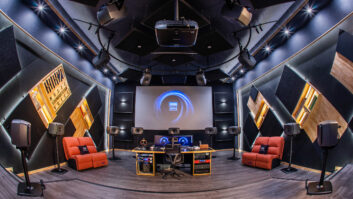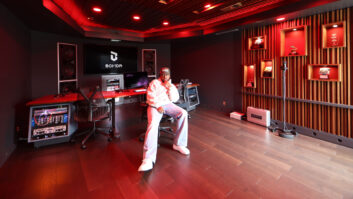BURBANK, CA—Nearly 30 years ago, commercial recording studio owners in Los Angeles banded together and tried to close down the city’s dozen or so home-based facilities for dodging business taxes and operating with improper zoning. Three decades later, home studios now feature prominently in L.A. real estate listings.
Dave Newton, founding member and one of two principal songwriters of U.K. jangle pop band the Mighty Lemon Drops, opened Rollercoaster Recording behind his house shortly after relocating to Los Angeles in 1995. “I was in a band for a while; we had some label interest,” he says. “I didn’t have a job and didn’t know what to do. We [Newton and his wife] had this nice place and this two-car garage which we weren’t using, and I said, it would be great to have a studio.”
The Lemon Drops parted company in 1992 after putting out five studio albums and a handful of live releases and compilations that made their mark on the U.K. and U.S. charts. Newton, who cofounded the band in 1985 after a couple of earlier musical ventures, was curious about the record-making process from the get-go.
“I think the first time I went into a recording studio was 1981. But I wondered how some studios could get a good drum sound and others couldn’t. Then we found Cargo Studios in Rochdale.” The studio, near Manchester, produced post punk classics by the likes of Joy Division, Echo and the Bunnymen and The Fall.
“When my band got a record deal and we got to work in some better studios with better producers, I would be the geeky, nerdy guy who would take notes. I’ve still got them, a Filofax with all the notes of what was done.”
Newton applied his production knowledge to 4-and 8-track demo recordings at home, he says. In the nineties, he added studio construction to his resume: “We had a yard sale, got rid of some junk, and I bought a bunch of drywall, sound board and insulation. The guy that helped me build this studio, Tommy Frank, had built a studio downtown. He gave me some tips. And it worked—I get a great drum sound. I owe him for that.”
Newton purposely made the control room as large as possible while also building a live room big enough to track drums. “I figured there would probably be more people hanging out in here. If we track live, we’ll put an amp in the hallway, maybe another amp baffled off and some people can play in here. I’ve done records that way, but most of the time, it’s getting the drums and the bass, then we’ll use the live room for overdubs.”
His intention had been to just record friends’ bands. But following Aberdeen’s 1994 debut on Sarah Records, his clientele soon grew through word of mouth. “You do your best all the time, of course, but if you do a good job on making a record and it starts getting a bit of attention, that leads—for somebody at my level—to other work.”
Many of the bands he’s worked with have been picked up by indie and even major labels. “I’d think, that’s it, I’m out of the picture now,” he laughs. “But they’ve continued working here.” Some of his recent clients include the Little Ones, the Happy Hollows, the Soft Pack, the Henry Clay People and the Blood Arm. Newton also records his own TV and film production music and solo projects at his studio.
An inveterate yard sale visitor, he’s picked up some gems for the studio, also combing the local Recycler for bargains. “I have a bunch of old EV mics, like the RE55. I paid nothing for them, and they’re sought-after now. I have a 666, another great mic,” he says.
“I bought a lot of gear at the right time, like these Telefunken V72s, racked by Dan Alexander.” His racks also house gear from Chameleon Labs, dbx, Empirical Labs and others.
Building when he did, Newton just caught the end of the analog console era, grabbing a Soundcraft Sapphire for sale at a local post house. “Jim Williams from Audio Upgrades did some work on it; he ‘widened’ the bus,” he reports.
Rollercoaster’s ADAM Audio A7 nearfields are complemented by a pair of Yamaha NS10s acquired from engineer and producer Tim Palmer, with whom his band worked on one album. “I traded a Baldwin 12-string semi-acoustic guitar for them,” he recalls.
“I’ll check a mix on the Aura-tones,” he adds, but also makes sure it translates to the in-ceiling speakers in his kitchen. “We listen to BBC6 Music while we’re cooking, so I know what it sounds like and can compare and contrast.”
Ten years ago, says Newton, “I thought of moving out and getting a bigger place, maybe get a partner. But I’m happy here; I get enough work, and I don’t have far to go to work.
“I was lucky that I got in at the right time. Drywall was a lot less expensive than it is now.”


